-
JAPAN CUTS July 26-August 6, 2023
Last edited by Chris Knipp; 08-21-2023 at 07:15 PM.
-
PLASTIC (Daisuke Miyazaki (2023)
DAISUKE MIYAZAKI: PLASTIC (2023)
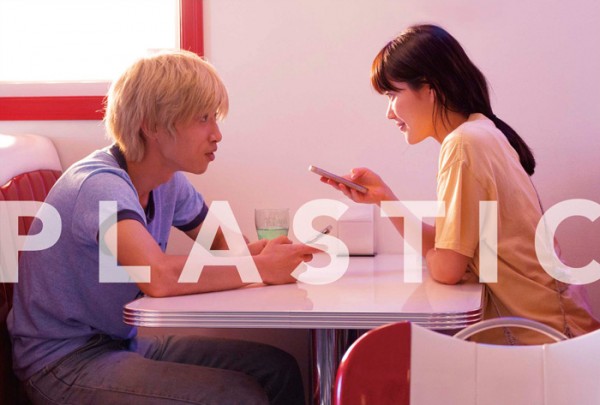
TAKUMA FUJIE, AN OGAWA IN PLASTIC
Youth, love-longing and a cult band
This charming, delicately melancholy film is extremely Japanese. Every conversation is a symphony of things half said or unsaid, and the more touching for it. This is about music, about dreams of fame, of fetishizing a cultish favorite band. It all revolves around two high schoolers, Ibuki (An Ogawa) and Jun (Takuma Fujie). Jun, with attention-getting long bleach-blond hair, is a guitarist. They are in Nagoya. He has just come from Tokyo when they meet, after a bad experience. A band, seeking commercial success has sought to expel him, and his refusal to leave has led to a fight and expulsion from school.
Jun now lives with his grandfather, an old music fan in a hip T shirt with a lovely immaculate antique Fifties Jaguar, which he allows Jun to drive.
Ibuki has faith in him, and they quit high school and live together. It's not so much what happens, though, as how it happens. Plastic, Miyazaki's third film, is directly inspired by musician Kensuke Ide’s eclectic concept album "Contact from Exne Kedy and The Poltergeists," which imagines the existence of a fictional 70s glam rock band of the same name. The idea of a message sent out into space that takes 25,000 light years to get there becomes a metaphor for longing.
Was there anything behind Jun's grand schemes and boasts of being on the verge of recognition? Anyway, when he and Ibuki live together away from family support and he gets jobs that pay poorly, he has no time or inspiration for music. "Plastic" refers to a scheme Jun and a friend try to grow and sell those microorganisms or enzymes that reputedly consume plastic. At this point Jun loses the bleached hair for a while and it's slicked back and black.
Ibuki and Jun originally connected because both idolize Exne Kedy, a 70's glam rock band (invented based on Ide's concept album), and long for its return. Leaps through time lead to the breakup of Ibuki and Jun, and jump into covid, with a series of three sequences set in three Augusts in this period. They have broken up, but he thinks of her, and when he calls her, even late at night, she answers.
It's wonderful what rich material Miyazaki weaves from trifles. A particularly good scene shows Jun noodling on an electric guitar. He keeps setting it aside to text Ibuki, He calls her outside and mid-conversation says "Are you there, Ibuki?" And she says she is and asks, "Are you there, Jun?" Just "Hello?" seems like a declaration of love, or love-longing. An hour in, sudden news of Exne Kedy’s surprise 50-year reunion re-invigorates their connection.
In interview by Natalie Ng in Filmed in Ether with Miyazaki shows how he understands the themes Plastic delicately interweaves in this touching portrait of youth that shows "what it means to be young and confused, how the bands we love as young people shape us," and "music’s powerful ability to bring people together."
Kensuke Ide's music throughout helps define the film. The Luca Guadagnino of the TV series "We Are Who We Are" might like Plastic.
Plastic, 104 mins., premieres in Japan Cuts, New York. Showtimes:
Friday, July 28, 2023
9:00 pm Q&A with director Daisuke Miyazaki.
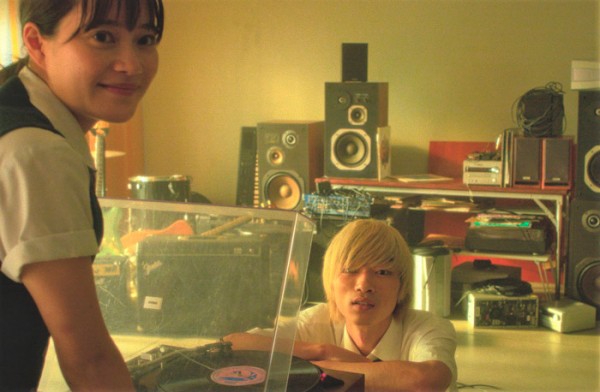
AN OGAWA, TAKUMA FUJIE IN PLASTIC
Last edited by Chris Knipp; 09-06-2023 at 12:55 AM.
-
BEST WISHES TO ALL みなに幸あれ (Yuta Shimotsu 2023)
YUTA SHIMOTSU: BEST WISHES TO ALL みなに幸あれ (2023)

Creeped out by her rural grandparents
Yuta Shimotsu's feature debut Best Wishes to All みなに幸あれ, a troubling, but ultimately disappointing puzzler, is about a Tokyo nursing student dedicated to doing good at every opportunity. We follow her on a break-time visit to her grandparents in a peaceful village setting. The grandparents seem sweet and very happy, but then odd things start to happen. Shimotsu provides a disturbingly weird J-horror-inspired first 30 minutes. I was genuinely unnerved by those scenes in the old folks' house. Unfortunately, things don't build or even connect very well in the scenes that make up the concluding fifty-five minutes.
It's not the fault of the actors. Everyone does their job competently, and Kotone Furukawa who won the Berlinale Silver Bear for her performance in the second segment of Hamaguchi's celebrated three-part Wheel of Fortune and Fantasy (2018), is fine in the lead. There is great use of the seemingly soothing and the mundane: the idyllic rural setting, the sweet, conventional grandparents, the grandparents' classic traditional Japanese house, all of which become the more disturbing because of how reassuring they seemed at first. The tech aspects and location shooting are fine. But there is a line between disturbingly weird and incoherent that is crossed - going in the wrong direction.
There's a concept here - in fact the film seems to get lost in it. Maybe it would have been better without one, because it seems to come in and out of focus, as does the "fantastic" element. The screenplay seems to have needed further work, or the filming of it needed more cinematic flair. The general idea is something about happiness, and whether you earn it through doing good or, well, being evil, e.g., by selectively tormenting others. ("What would you do for happiness?" is a slogan for the film.) There also seems to be a conspiracy of evil practices in the village world the protagonist is visiting - one that some young people baulk at joining in on, usually giving up and acting like everybody else in he end. Apparently this happens to the protagonist. But since at the end she has gone back to Tokyo and resumed her life as a nursing student, that's not clear.
There are also hints that the protagonist has been having disturbing flashbacks to earlier experiences - or may even be imagining a lot of this, since some moments certainly are only her mental "what-ifs." But that also isn't worked out forcefully enough to cohere; indeed further undercuts the coherence of what should be the film's main development section. Shimotsu and his co-writer Rumi Kakuta developed a great opening half hour and apparently didn't realize the rest needed more work. Unless your an offbeat Japanese horror-concept movie completest this film can't be recommended.
Best Wishes to All/aka Regards to All みなに幸あれ, 89 min., debuted at Shanghai Jun. 10, 2023, also showing at Bucheon fantastic festival July 1. Screened for this review as part of the NYC Japan Society festival Japan Cuts, where it was shown Thursday, July 27, 2023 at 9:00 pm. (North American premiere.)
Last edited by Chris Knipp; 07-31-2023 at 05:33 PM.
-
CONVENIENCE STORY コンビニエンス ストーリー (Satoshi Miki 2022)
SATOSHI MIKI: CONVENIENCE STORY コンビニエンス ストーリー (2022)
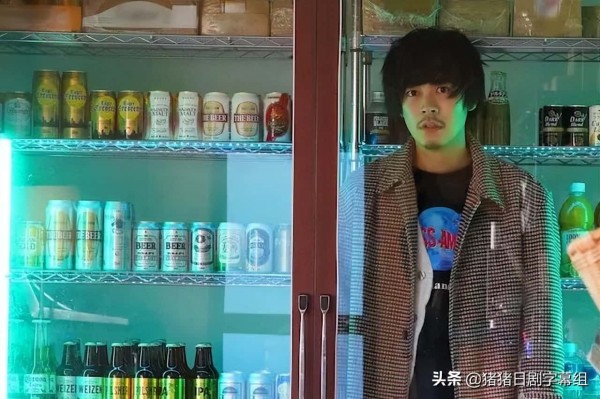
RYO NARITA IN CONVENIENCE STORY
Fantasy blends comedy, romance, whimsy, a touch of menace
In Convenience Story, Kato (Ryo Narita) is a cute, scruffy young screenwriter (with a rep of producing scripts for unoriginal 'male fantasy films'). (Note: he does have talent and facility, though he's a bit of a slacker, perhaps.) He lives with Zigzag (Yuki Katayama), an aspiring actress. While she is aceing an audition by reacting quickly to being "killed," Kato goes astray. He goes to great lengths to get their dog Cerberus a special dog food that comes in a jar, called "Weredog." But Cerberus sabotages his laptop, erasing all the text of the screenplay he is working on, which is due very soon. Understandably incensed, Kato tries to drive to a remote location to ditch the dog. But that night he goes back to search for the pet when Zigzag misses him. There he runs out of gas, and meets Keiko (Atsuko Maeda), the beautiful proprietress of a konbini (convenience store), who puts the make on him. By walking into the store, he has entered an alternate reality.
She lives with Nagumo (Seiji Rokkaku), an amiable eccentric, tall, cherubic, perhaps a touch dangerous, who dresses up in evening clothes and goes out into the woods to "conduct" symphonic music played by an "orchestra" of generator-powered loudspeakers, each of which has its own umbrella attached, in case of rain. Impressive to us and also to Kato, who visits, but declines to take the baton. Kato moves in temporarily at the living quarters adjoining the convenience store, whose cheap magazines give him ideas for screenplays. Kato and the Keiko make love in his stalled truck, within earshot of Nagumo's electronic forest orchestra. It seems unlikely that Nagumo is unaware of Kato and Keiko's dallying. They escape by taking the nearest bus, which goes to a hot springs and festival - but amid the festivities, Nagumo turns up, in a mask.
Luckily, It's all a dream. And yet while all this excitement is going on, Kato composes a successful screenplay! Convenience Story dabbles perhaps a bit too much in its pretty yellow, green, blue, and red color filters, and seems about to come to a standstill at times. But I found this fantasy amiable and diverting, an agreeable, human-scale example of analogue storytelling that's a relief after the overstuffed multiverses of movies like Everything, Everywhere.
This oddball material was inspired by veteran Japan Times film reviewer Mark Schilling, one of Miike's early champions, who proposed the convenience store theme and gets a co-writer credit as ah homage. According to Rouven Linnarz in Asian Movie Pulse Satoshi Miki, who has compared his work to Monty Python, is a director who's "made quite the impact" on Japanese comedy. He focuses on "odd or troublesome" aspects of the culture, which here seems to have been the ubiquitous twenty-four-hour convenience everything store. To an outsider Convenience Story has plenty of charm, even if its "comedy" leans toward the whimsical and the meandering.
Convenience Story, コンビニエンス ストーリー, 97 mins., was shown in at least nine festivals, staring with Fantasia, Montreal, Aug. 1, 2022. It was screened for this review as part of the Jul. 26-Aug. 6, 2023 Japan Cuts. Showing at Japan Society, NYC, Aug. 3, 9pm.
Last edited by Chris Knipp; 07-31-2023 at 10:54 PM.
-
When Morning Comes, I Feel Empty 朝がくるとむなしくなる(Yuho Ishibashi 2023)
YUHO ISHIBASHI: WHEN MORNING COMES, I FEEL EMPTY 朝がくるとむなしくなる (2023)
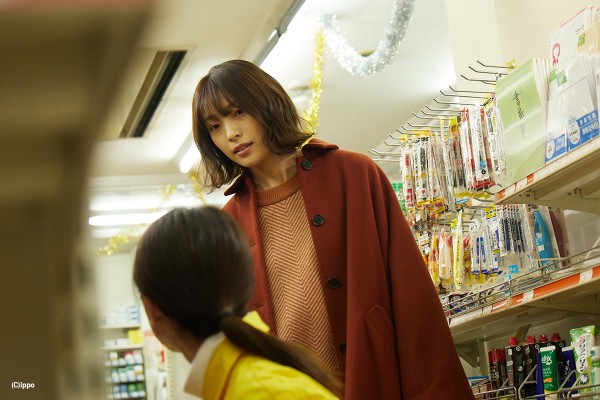
https://psychocinematography.com/202...iew-oaff-2023/
Subtle picture of a young woman pulling away from societal pressure
This little film, Ishibashi's second feature, patiently explores the world of Nozomi Iizuka (Erika Karata of Asako I & II), a 24-year-old single woman in present-day Japan finding. her lonely way a bit outside conventional expectations. She has quit her company job and works part time at a kombini, a Yamazaki chain convenience store. Six months go by before she dares to call and tell her mother or this. She lives by herself in another town. The breakthrough is becoming friends with a junior high classmate, Kanako (Haruka Imou). She works too, but they find each other thanks to Iizuka's willingness to fill in on the night shift at the store.
Yuho Ishibashi's strength as a director is her sensitivity to the delicate unfolding of these two women to each other through their traditional Japanese shyness, the minimalism of Japanese speech. Sadly, the below-par English subtitles are not up to the job of conveying these subtleties. Luckily actions speak for themselves when Iizuka is clerking at the store, getting drunk with friends, being guided home by a cute younger male fellow employee she fancies, and later by Kanako. Kanako needs Iizuka. She says she can't connect with her former classmates. The two young women go bowling, and Iizuka is terrible: but it doesn't matter because it's the sharing that counts. Iiuka stays overnight with Kanako at her grandparents' house where she lives. It's almost a two-girl pajama party years after the age when either young women did such a thing - but we feel how they need it and benefit from it.
Iizuka's gradually developed closeness with Konoko, the time spent, the sharing about her discomfort at the company job and alienation from parents through quitting it, finally gives Iizuka the strength to call her mom and "confess." The positive slant of the film comes in her mother's gentle reception of this news: she is glad Iizuka hasn't had a child or gotten involved with a religious cult. She reassuringly tells Iizuka "You did your best," and reminds her that most of her life is still ahead of her. She promises to break the news to Iizua's father gently. A big moment in the film, simple and decisive; a sort of climax, though what has come before is more important and much more complicated.
This is a patient film, process-oriented and almost transactional. It takes a little more time, even with waking up and getting out of bed, eating breakfast, sipping ramen in the evening. Even the drunken scenes are handled tastefully. The scenes between Erika Karata and Haruka Imou are fine. It doesn't hurt that both actresses are beautiful, especially Karata, which makes everything feel more universal. This film, which has a touch of Ozu and Koreeda, is a wonder of delicacy - which good subtitles would have enabled the Anglophone viewer to appreciate further.
The soft guitar and keyboard score is appropriate but underlines a certain blandness. The film leaves questions unanswered, possibilities unexplored. As her mother says, Iizuka's life is more than half ahead of her. But what about the immediate future? Will things with the young male coworker develop? Is Iizuka going to be a convenience store clerk forever, or go back to school, like Kanako? Is this a solution or an escape? Just how shitty was her company job? Maybe we don't realize how stifling social pressures are in Japan, and this is a hint of that.
When Morning Comes, I FeelEmpty, 朝がくるとむなしくなる, 74 mins. International premiere at Japan Cuts, Japan Society, NYC Thursday, August 3, 2023, 6:00 pm.
Last edited by Chris Knipp; 07-31-2023 at 11:28 PM.
-
FROM THE END OF THE WORLD 世界の終わりから ( Kazuaki Kiriya 2023)
KAZUAKI KIRIYA: FROM THE END OF THE WORLD 世界の終わりから (2023)
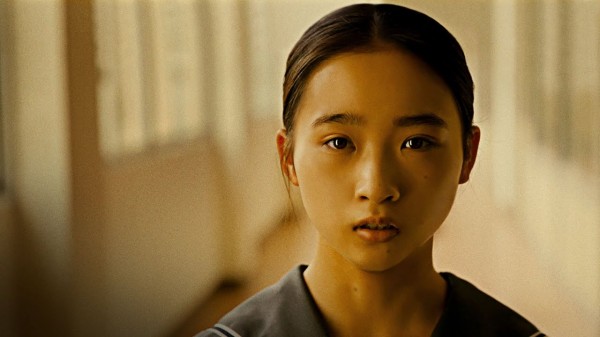
AOI ITO IN FROM THE END OF THE WORLD
A girl's dreams called upon to save the world
This is another one of those films about the apocalypse - and hoping to manage at the last moment to avoid it. It's a lot of pretty images and, to signify leaps between dream and reality, rapid shifts from color to black and white - a device becoming very familiar lately, used even in the great new Christopher Nolan film, Oppenheimer. There's a succession of well-differentiated characters, a plus. They all revolve around a teen protagonist: a mild high school senior called Hana (Aoi Ito). She lost her parents some time ago. But she has various companions and protectors, especially since it's emerged that she alone, through her dreams, can prevent the world - especially Japan's corner of it - from coming to an end. There are also resentful and hateful people who misunderstand her and wish for her demise.
Actually, to be honest, this isn't convincingly the end of or salvation of anything. But according to his statements, it is promised to be director and former music video wunderkind Kazuaki Kiriya's last feature film. James Hadfield in his Japan Times review of this work runs through the director's 2000's oeuvres and finds them underwhelming, none more than this one. He deems retirement advisable.
But back to the new film. Why we don't know, but just as Hana has lost her last remaining relative, she is visited by government agents terribly interested in her dreams. We plunge into one of those, in black and white, taking us to perhaps 16th-century Japan and warring samurai, who almost kill Hana. Escaping, she meets an elegant, high-coiffed mystic lady (Mari Natsuki) who becomes her mentor and sends her on a quest with young, small Yuki (Mio Matsuda) as her guide. Back in the real world (and color) Hana sees the lady again, her robe now a deep, satisfying crimson. Her person and her garment bring class to this movie. The lady gives Hana more explanations of the impending end of the world and her ability to stop it. She pages through ancient-looking books in strange hieratic script that recount everyone's life, past, present, and future, and explains that the lives of everyone living all end in two weeks. These books (along with the lady's crimson robe and her makeup and tall mound of hair like a crown) are my favorite props of the film, for their script, somewhere between cuneiform and braille, and the mystic lady runs her fingers over them in a satisfyingly tactile way.
There is a high official in the Japanese government who strenuously objects (as well he might) to having a 17-year-old girl put in charge of the fate of things, and on the basis of dreams. (If the film had taken note of its own absurdity, it might have had something.)
Hadfield, to illustrate his lack of admiration for this movie, mentions Netflix movies, a game, and an anime series he thinks Kiriya's film is all too similar to. I am not familiar with those. But From the End of the World, while Kiriya's film is handsome, especially when Mari Natsuki is on the screen in that deep crimson dress, and the staging of scenes is also good looking, it is otherwise neither original nor all that exciting. It's especially troubling that such a beautiful "look" is achieved, but the screenplay fails to clarify basic details. Why and how is the world coming to an end? Just how is Hana's dreaming supposed to arrest this turn of events?
Hadfield provides some technical comments: the director departs from green screen and the backlot and shoots, often handheld and wide-angle by Chigi Kanbe (he's reminded of Sam Raimi), on location. He suggests that budgetary restraints serve in the film's favor here, "giving it an endearing DIY energy," though - I'd strongly agree - the 135-minute run time makes the movie feel "stretched thin." Compare Chris Marker's 28-minute Le jetée.
At the end, people start dying or getting killed, with a lot of weepy closeups, and this is an element that feels particularly cloying. Refrained is better, and much the Japanese style. But the point is Hana, debating with others, decides people are too much of a mess and it's best that the world should end. There's a rather nice final scene of a far-in-the-future person digging up a time capsule containing a cassette tape with Hana's statement about this, and her wish that the later world has turned out to be better than hers was. Again, stoicism would have put across the idea much better.
From the End of the World 世界の終わりから, 135 mins., released in Japan Apr. 7, 2023. IT was screened for this review as part of Japan Cuts 2023., where it will be presented:
Saturday, August 5, 2023
9:30 pm
Last edited by Chris Knipp; 09-06-2023 at 01:07 AM.
-
I AM WHAT I AM そばかす (Shinya Tamada 2022)
SHINYA TAMADA: I AM WHAT I AM そばかす (2022)
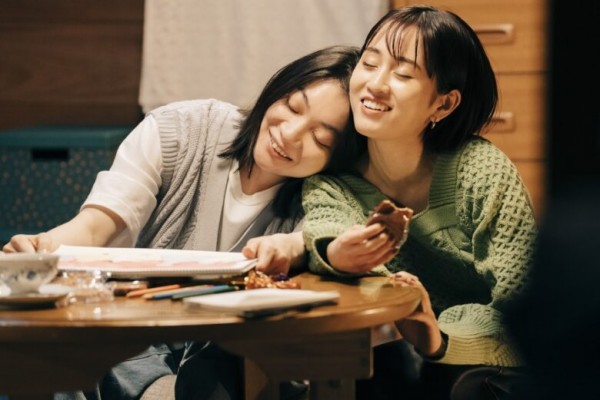
TOKO MIURA, ATSUKO MAEDA IN I AM WHAT I AM
An anti-romcom: a woman establishing her oddball asexual identity in conformist Japan
Kasumi (Toko Miura of Drive My Car) is odder than she may at first appear. She's not just lagging behind. She is really different from others: She is asexual, and in addition is unable to have romantic feelings for other people. This film's "journey toward self-acceptance" escapes triteness because this is a rare personality quirk and no easy answers are found. The film comes to terms with itself, as it were, as an oddball piece, a sort of anti-romcom. Tamada's film fits in somewhere, though. It's the third film, following Yuka Yasukawa's 2021 The Nighthawk's First Love and Takuya Kato's 2022 Grown-ups, in a project called "(Not) Heroine Movies" from Nagoya Broadcasting Network designed to subvert female film stereotypes. My only problem with Am What I Am is that the protagonist never quite won my affection. How does one learn to like someone who lacks feeling? I kept wishing she would find the odd man who won her heart, or discover after all she was gay. But no: her unhappiness, her uncertainty, her outsider status, is symbolized by the recurrent scene where she sits alone on a beach -staring out at the sea. The movie charms, in its offbeat way, with its refusal to conform.
Originally titled そばかす (Sobakasu, "Freckles"), this film is about that very difficult subject in Japanese culture, a person who does not fit in. Worse still, Kasumi is a woman who doesn't fit in. Even worse than that, she has reached the age of thirty, and has not married. There are no compensations. She is not a brilliant talent. A music school dropout, she has stopped playing the cello - though her father maintains the instrument just in case. She is working at a crappy job as a clerk in a big call-answering service. She still lives with her family. Problem posed. How will it be solved? Actually it will not exactly be solved. Its "victim" will learn to live with it and so, teach others to do so - and show us that such people exist.
The screenplay progresses in loose, almost improvisational fashion. The home life and job scenes are sketched in. There is a "mixer" or uncommitted double date, but this affair with all its chatter about girl-likes and boy-likes drives Kasumi to flee to a solitary ramen shop. Her mother forces her into an omiai (arranged marriage interview). Inspiration: she and the guy secretly confer after and she learns he's equally uninterested in marriage, wants to focus on his - ramen shop. They bond for a while.
Kasumi gets away from the call-answering to work in a kindergarten, connecting comfortably with kids. But, ironically, her oddity is highlighted there too, because even the kids form into couples (gay and straight!) barely beyond toddler stage. A coworker feels comfortable telling her he's gay: perhaps her sensed neutrality helps people open up.
Living with family provides more plot, of which this film has no shortage. Her grandmother talks of her four marriages. Her pregnant sister is paranoid about her husband's cheating on her. Her parents' marriage is strained by her mother's insecurity and she discovers that her father is depressed. He wanted to be a a musician. Does Japanese conformity force more people to abandon their dreams, or is this just what happens everywhere? Are happy marriages in very short supply?
A solution is found when Kasumi meets a bright, charming former classmate, Maho (Atsuko Maeda). Here is another woman who's unmarried, and her former having been a porn star marks her as an oddball too. Kasumi and Maho have a great times, even going on a camping trip together. They are going to live together - only to have that hope dashed when Maho reconnects with a former boyfriend and they decide to marry. Maha asks Kasumi, who seems to accept this disappointment philosophically, to be a main speaker at the wedding. Kasumi tells her father she will play the cello - this one last time. (This authentically imperfect performance is somewhat excruciating.)
A key, perhaps overly expository, moment is the special version of "Cinderella" Kasumi crafts for the kindergarten, with a Cinderella who does not want the prince.
At the end, the film finds a kind of resolution when Kasumi finds, and semi-bonds with, someone like herself, another new kindergarten male coworker, a great comfort to simply know one other asexual, unromantic, friendship-only person exists. He invites her to a movie, then when she warns him she isn't capable of a relationship, he explains why that's fine. He has heard about her version of "Cinderella" and seen they are two of a kind. He wants no relationship either. At the end, she acts out her favorite Tom Cruise sequence, in War of the Worlds , - the one where he is running away from something, not toward. That is the way her life is to be.
But hey, this was a cute boy going to the movies with a cute girl. This is a movie: what are you going to do?
I Am What I Am そばかす, 105 min., was screened for this review as part of NYC's Japan Cuts, where it showed Jul. 28, 2023.
Last edited by Chris Knipp; 08-02-2023 at 12:13 PM.
-
WANDERING 流浪の月 (Sang-il Lee 2023)
SANG-IL LEE: WANDERING 流浪の月(2023)
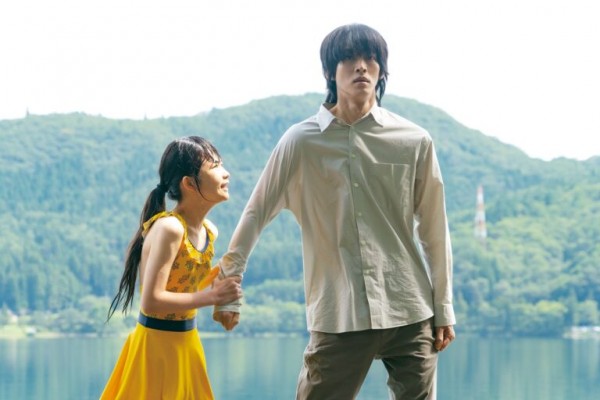
TAMAKI SHIRATORI, TÔRI MATZUZAKA IN WANDERING
Sympathy for her kidnapper, 15 years later
Wandering is a beautiful and challenging film, pushing boundaries and challenging stereotypes. Tighter editing (even the festival blurb calls it a "sprawling account") would have made it a classic of the genre of sexual adult-child hauntings like Serge Bourguignon's famous 1962 Sundays and Cybèle. This film lacks that haunting simplicity. On the other hand, its complexity is more real, more fully contextual, with more time to ponder the nuances. Sundays and Cybèle would not play in today's America, nor would a film as open-ended as this be made here.
Sarasa Kanai (young, Tamaki Shiratori) has had a complicated childhood. She was mistreated by her aunt and sexually abused by her 14-year-old cousin. So when a strangely haunted, beautiful young man called Fumi Saeki (Tôri Matsuzaka), hiding under a mop of hair, came up with an umbrella as she sat in a park in a rainstorm, she opted to go home with him. He was 19; she was 10. She lived happily with him for several months: it was the freest and the safest she has ever felt, a time of bliss. She was reported missing, and searched for. When they were found, Fumi was taken to juvenile detention and treated as a sex offender. It's not that simple. Perhaps he was a pedophile, but it was platonic. He let Sarasa eat as she liked - lots of ice cream and lots of ketchup on her eggs. Being with Fumi was heaven for her, his sudden removal devastating. Wandering, adapted from a novel by YA writer Yu Nagira, asks us to weigh Fumi's possible "grooming" of Sarasa against the kindness, and the happy space he provided.
We are fifteen years later. Sarasa (now played by beautiful (Suzu Hirose) is twenty-four and works in a restaurant. People know about her past, but nobody has ever understood what Fumi meant to her. She's presently involved with a respectable salaryman, Ryo (Ryûsei Yokohama), who has a good job and family land. But he is the villain of the piece who turns out to be, first, controlling, then, physically abusive.
Her perky coworker Ayumi (Mikako Tabe) takes Sarasa after hours for a drink in an unusual two-storey café. Serving only coffee, it is decorated with soft colors, curtains, old objects, wood furniture. The manager who waits on them is Fumi. He doesn't recognize Sarasa. But he also hasn't changed.
We, and Sarasa, now continue to revisit her preteen moment with Fumi, and now more than ever it seems to have been her happiest of times. Rather than reintroduce herself to Fumi, Sarasa becomes a regular customer — and nighttime stalker. When she discovers that Fumi has an adult girlfriend (Mikako Tabe), she begins to feel jealous. Ryo finds out, and Fumi now knows Sarasa.
What can we make of this? As Mark Schilling describes the film in The Japan Times the story "unfolds on the borders between manga-esque fantasy (Nagira once wrote 'boys's love' comics and their influence shows) and the harsh realities of Japanese society, in which hate on the internet can be overwhelming and everlasting." It is perhaps this navigating back and forth over such gulfs that slows down Wandering to an almost dreamlike pace, heightened by the fact that as Fumi, in a striking performance, Tôri Matsuzaka is almost trancelike. Suzu Hirose also has long, dreamlike pauses. One is more than ever aware of the minimalism and meaningful silences of Japanese speech and how much is left unsaid.
The Korean-descent, Japanese-born-and-raised Sang-il Lee is a bold explorer of difficult issues (as his 2010 Villain and 2016 Rage have shown) who is also capable of marshaling a top-notch cast and splendid crew, including in the latter notably the cinematographer Hong Kyung-pyo (Parasite,) and composer Marihiko Hara. Schilling comments that Hong shoots "with steely precision and elegiac beauty." The last hour isn't up to the first ninety minutes, and though the transitions between moments in time is seamless and subtle, the editing could have moved things faster. Still, a haunting and troubling experience. One of the most beautiful films of Japan Cuts 2023.
Wandering aka Wandering Moon 流浪の月, 150 mins., debuted at Jeonju Apr. 30, 202, showing at half a dozen other Asian-film festivals. Theatrical release in Japan May 13, 2022. Screened for this review as part of Japan Cuts (July 26-Aug. 6, 2023), showing at the Japan Society Tuesday, August 1, 2023 at 9:00 pm. (Beside Schilling, also reviewed by Richard Gray in The Reel Bits and David Erlich in IndieWire.)
Last edited by Chris Knipp; 08-04-2023 at 10:46 AM.
-
HAND 手 (Daigo Matsui 2022)
DAIGO MATSUI: HAND 手 (2023)
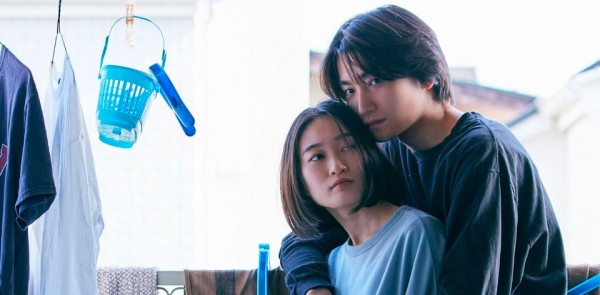
AKARI FUKUNAGA AND DAICHI KANEKO IN HAND
Are you attracted to older men?
Pinku or Nikkatsu’s Roman Porno films are a Japanese softcore series unlike anything we have, which continues, revived, and done by good directors. This is the first in a new series, according to Richard Gray in The ReelBits. It's rather crazy to watch a film that can be taken pretty seriously but that has an operating rule that it has a softcore sex scene every ten minutes (the run-time is traditionally kept to 80 mins. or so and the whole film shot in under a week, but these rules clearly were not followed). There is also voiceover narration/commentary. That always adds class to a movie, doesn't it? It's a feature of the nifty new (here) neo-noir ramble about romance and urban decay from Na Jiazuo, Streetwise, whose pensive languor reminded me of Wong Kar-wai. Hand is adapted from an Akutagawa Prize-nominated story of the same name by Nao-Cola Yamazaki.
I don't know how much Hand follows the rules of earlier Pinku films, but once I adjusted to its high titillation level, I swung with it, even though it contains a mixture it's hard to assimilate. The focus is on the slightly bucktoothed but elegant and cute Sawako (Akari Fukunaga), who is twenty-five, and has a fixation on older men, partly caused by a fascination with her own father. His is the first hand referenced. She has put together several scrapbooks of "happy old men" and other such. But for all the eroticizing or obsessing, Sasako is being eyed by a young guy at the office where she works, Mori (Daichi Kaneko), who gets another job, and takes this occasion to reveal that he's had his eye on Sawako. He moves in quickly, and they start having sex.
Sawako says she's glad Mori is experienced. But maybe he just has a good mix of natural skill, confidence and motivation, because it turns out later he may not have tried many positions. The regular sex of this erotic affair gives a lot of pleasure to Sawako too, and builds her self-confidence. It turns out that Mori is engaged though, so either he plans for Sawako to be a permanent mistress, or, since this is Japan, not 1950's France, it's a last fling. (Kaneko and Fukunaga, in any case, have great chemistry throughout: doing simulated sex scenes may be a good way for actors to get relaxed with each other.) However, when it turns out Mori has decided it's their last time, it's sad, painful, resentful. The "hand" this time is Mori's, and Sawako holds it and declares it "a liar's hand."
Another switcheroo comes too. Sawako has a meeting with an older man. But after Nori, the nature of her interest now seems fetishism. Beside that, the man is too old, or too uncomfortable, to make passes. And now, Mori reappears, wanting one more time. So the film gives us one more time, and then another farewell, more complicated and ambiguous than the first. Mori weeps and says "I really love you." But what kind of love is it, really, if he's marrying somebody else? He's just a guy. But even when they get excited and do it in the shower, he runs out and grabs a condom, as practical as he is eager. Even if only a sex partner, he's an ideal one. Sawako regrets that she will not live to see Mori turn into an old man, and vice versa. We feel the same.
What will happen to Sawako? Her younger sister knows she's having an active sex life and asks for advice - for herself and her equally inexperienced fiancee, whom we watch doing it the first time in a tackily grand little hotel bedroom. But in conservative, male-dominated Japan, what are Sawako's chances of future happiness now? That we actually ask that, and are able to ponder the authenticity of Mori's motivations and feelings, shows how adroitly director Matsui has adapted a softcore sex format into a believable framework even Éric Rohmer might have used to advantage. A great film for Paris on a rainy afternoon - or for New York's Japan Cuts.
Hand 手, 99 mins., released in Japan Sept. 16, 2022; also shown in Taiwan, and in 2023 at festivals in Rotterdam and Beijing. Screened for this review as part of Japan Cuts (Jul. 26-Aug./ 6, 2023). Shown at the Japan Society Sat., Aug.29, 20223.
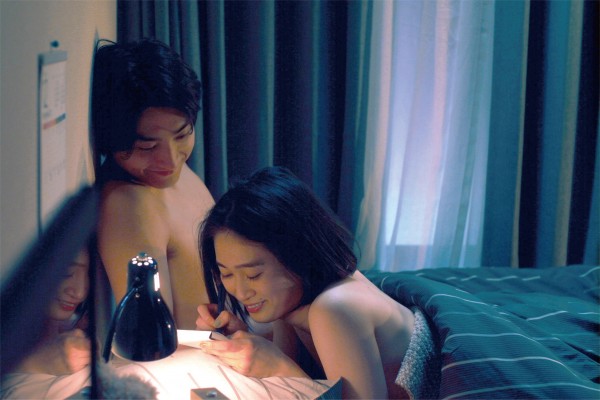
DAICHI KANEKO AND AKARI FUKUNAGA IN HAND
Last edited by Chris Knipp; 09-06-2023 at 01:14 AM.
-
JC20020 (Hiroki Kono 2022)
HIROKI KONO: J005311 | (2022)

KAZUAKI NOMURA IN JC20020
Fire out of embers
The most uninteresting film turns out to the the most fascinating one; an intimate, painful, touching experience, a piece of Bressonian vérité so drab, so without frills, you carry its car-sounds and shoe-sounds and crunch of snow with you in your ears - in your head - long after the movie has come to its ambiguous, yet satisfying end.
Laszlo Nemes’ directorial debut Son of Saul (Cannes; NYFF, 2015) may come to mind watching this minimalist, claustrophobic, disturbingly real-feeling film with patient, hypnotically tenacious cinematography by Hikaru Sano. It costars the first-time director, actor Hiroki Kono, in a red jacket and audacious bleached hair, with hopeful sneakers. Slick, cocky, his character is yet a useless marginal figure, a petty thief, a purse-snatcher. His name, we eventually learn, is Yamamoto.
The protagonist, whom the camera follows most of the time as if it were inside his chest, is Kanzaki (Kasuaki Nomura). In a drab coat, buttoned up to the neck, looking meekly into space or downward, he's a pathetic creature. But he is determined. He has a leather bag over his shoulder. He has a mission. A salaryman, a white - or should we say shite? - collar worker, but one no more, he has kowtowed to a boss over the phone but set out this morning on another path.
Unable to get a taxi, he sees the thief in action and runs to catch him and says he will pay him ¥1 million to take him somewhere; it will take about half a day. (¥1 million is about seven thousand dollars.) The thief takes the downcast salaryman for a doofus, a loser, and tells him to piss off: they scuffle, leaving the salaryman on the sidewalk. But he struggles up, regains his leather bag. The thief comes back, and the process starts, with Kanzaki withdrawing he money. They rent a car, and hit the toad. Suspicious, the punkish chauffeur demands ¥200,000 up front; and doesn't believe the story of going to meet "a friend."
So now it's a road picture - the drabbest kind, on a dreary highway, in winter. The camera rides in the middle, up close, and we can barely see more than Kanzaki's shoulder and chest and the side of Yamamoto's face. They hardly speak, but exchange names, belatedly, and find they're the same age, 26. Yamamoto gets out to go to the bathroom, and we sit for five minutes with Kanzaki. We sit, and sit, feeling the taste of real time, with ambient sound, unrelieved by any score.
Imagine their food stop. The camera position different now, but not much more exciting, except we can simultaneously watch Yamamoto slurping spaghetti, Kanzaki munching what looks like maybe tofu. And when Yamamoto goes to the bathroom Kanzaki stuffs half the tofu in his mouth and almost chokes. We are always close to Kanzaki's desperate, dogged moves. The first shot of the film was him cleaning his teeth, from behind, very, very thoroughly. Long takes require patience, and if you grant it, you grant sympathy. The two dangers are pathos, or off-putting strangeness. But that "otherness" is also a sense of the real.
After this meal stop near Mount Fuji, we're not surprised when the pair part ways near the entrance to the notorious "suicide forest." It is best we know that this is what it is. What happens hereafter would be too much of a spoiler.
What's different from Beckett, or Bresson, is a central idea that is ambiguously hopeful, out of astronomy, because the title is the name of a star formed by the collision of two nearly-extinguished stars.
J005311 93 mins. Winner of the Grand Prize at the 2022 Pia Film Festival in Tokyo. The Pia, Japan's first film festival, has debuted some of the hottest new directors. Screened for this review as part of Japan Cuts, NYC, where it was shown Thurs., July 27, 2023 at 6pm. The International Premiere. It was shown as a Next Generation section film in Japan Cuts, and as such received mention from the Obayashi awards, which said "The jury also recognizes director/actor Hiroki Kono’s directorial debut J005311 with a Special Mention for “its considerable formal ambition and willingness to challenge us as viewers" and the "profound sense of economy" of its making. The top award went to Yusuke Morii's Amiko.
Last edited by Chris Knipp; 08-12-2023 at 08:51 PM.
-
KEISHI OTOMO: THE LEGEND & BUTTERFLY ジェンド&バタフライ (2023)

HARUKA AYASE, TAKUYA KIMURA IN THE LEGEND AND BUTTERFLY
Though the subject of Oda Nobunaga is a familiar one for a historical film for the Japanese audience, iThe Legend & Butterfy still quite an extraordinary, fresh, and enjoyable thing. The production values are terrific, the costumes and settings fabulous and accurate, but Keishi Otomo has thrown away the playbook, focusing very much on the relationship of Nobunaga and his wife, about which nothing is known. And at the end, after nearly three hours, when other epics would be growing weary, Otomo and his writer Ryota Kosawa, have gotten a new burst of anergy and flowed freely into fantasy, imagining a bold, romantic escape of Nobu from a battle he is losing, grabbing off his wife to climb into a Spanish ship (with beautiful ribbed sails) to a new land and a new life, surviving fire and shipwreck.
JAPANESE HISTORY & CULTURE MOVIES & TV (Tokyo Weekender)
The Legend & Butterfly is a Beautiful Lie About the Love Life of Oda Nobunaga
A review of the latest big screen adaptation featuring Japan's first Great Unifier, Oda Nobunaga
BY CEZARY JAN STRUSIEWICZ
MARCH 7, 2023
There are so many films, shows, games and comics out there about the 16th-century warlord Oda Nobunaga that many stories have resorted to, quite literally, demonizing the man in weirder and weirder ways in order to stand out. Director Keishi Otomo and writer Ryota Kosawa, however, have gone down a different route in The Legend & Butterfly (2023). While still playing with historical truth, they focus less on Nobunaga “The Demon King” (as he called himself) and instead show us Nobunaga, the husband of Lady No, the titular butterfly. . . . While The Legend & Butterfly is, at its core, fiction, it wears the well-researched dress of impressive historical accuracy. It’s honestly astounding how many things the movie gets right about Nobunaga, from the type of belt and pants he wore, to how he liked to style his hair, his later love of dance and so much more.
Mark SChilling, The Japan Times:
Keishi Otomo’s “The Legend & Butterfly,” which was made to commemorate the 70th anniversary of the Toei studio, looks like the sort of big-budget Japanese period drama that too often calls up adjectives like “dull” and “turgid.”
Based on a script by Ryota Kosawa, however, the film scraps the usual explanatory narration that brings back memories of soporific history classes — a daring choice for a mass-audience epic that clips through three decades in the complex lives of its two protagonists: warlord Oda Nobunaga (Takuya Kimura) and his wife, Nohime (Haruka Ayase).
Instead, it focuses on the pair’s relationship while brushing past much of what transpires around them, from clan wars to Nobunaga’s children by his various concubines. (Nohime was childless, though the film mentions a miscarriage.)
This will probably present little problem to Japanese viewers of the film since much of what it depicts has been told and retold in countless novels, TV dramas and movies. They know the outlines, even if details are missing.
The film also heavily fictionalizes Nobunaga and Nohime’s marriage, about which little is known. But by stressing the legend, rather than leaning on skimpy and disputed facts, the film brings a fresh, feminist perspective to its story.
It begins with the couple’s political marriage in 1549, with a young Nobunaga suspecting that his sharp-tongued and formidably intelligent bride is a spy for her father, the lord of the neighboring Mino domain whose nickname is “The Viper.”
Heir to the Owari domain in what is now western Aichi Prefecture, Nobunaga is proud and arrogant, but also eccentric, yukking it up with clownish retainers and dressing in flashy-but-sloppy garb. Not surprisingly, Nohime regards him as a thick-headed fool. In scenes played for laughs, she also bests him as an archer and saves him from falling off a cliff. His respect for her grows, if not yet his affection.
A turning point comes in 1560 when Nobunaga, now the lord of Owari, is confronted with an invading army many times the size of his own. Just when he is on the point of committing seppuku (ritual suicide), Nohime proposes a battle plan and even an inspirational address to his troops. Her suggestions turn out to be brilliant and Nobunaga realizes that his prickly wife has her uses.
The film then downshifts from this fast-paced and entertaining start to Nobunaga’s long, blood-soaked quest to destroy his enemies and unify Japan, with the years and big-scale battle scenes blinking by. Along the way, Nobunaga and Nohime finally connect romantically over the course of an eventful day spent walking around town in disguise to experience “normal” life, and their story begins to follow a conventional romantic drama course.
Playing the grim-faced, middle-aged Nobunaga, Kimura is almost unrecognizable from his heyday as a member of the superstar pop idol group SMAP, but his heartthrob charisma still shines through and keeps the character from becoming completely hateful. A bigger revelation is Ayase as Nohime. Once known for her roles as chipper, wide-eyed ingenues, Ayase dominates the screen with everything from the fierceness of her royal glare to the fineness of her comic timing.
By the end of this 168-minute film, however, I was feeling in need of a refresher course in the Warring States era. Perhaps “The Legend & Butterfly” should have been a streaming series, with more context for the historically challenged. But not, please, another dull, turgid TV costume drama.
Last edited by Chris Knipp; 08-11-2023 at 06:00 PM.
-
TOKYO MELODY: UN FILM SUR RYUCHI SAKAMOTO (Elizabeth Leonard 1984)
ELIZABETH LEONARD: TOKYO MELODY: UN FILM SUR RYUICHI SAKAMOTO (1985) - JAPAN CUTS 2023
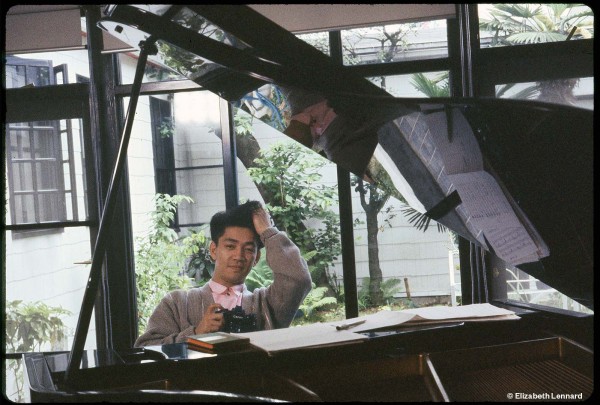
WATCH ON FACEBOOK
Portrait of the artist at 33
As a commemoration of the life of the multi-hyphenate musician, composer, artist Ryuchi Sakamoto (January 17, 1952-March 28, 2023) this time capsule, a Franco-Japanese television co-production from Elizabeth Leonard from 1983 isn't bad. It catches him in his thirties, already at his peak, composer of his famous score for Merry Christmas Mr. Lawrence and a master of looping, sound sampling, and other computerized, electronic means of performing and composing music. Sakamoto is mercurial yet calm, playful yet intensely focused, pronouncing ideas about music and modern urbanized Japanese culture, moving around at ease in the studio. Leonard provides semi abstract, urban interludes of images concrètes that are abstract and beautiful, like musique concrète. The short film is a suave, masterful whole depicting a modern musical master.
There is a blend here of a sampling of studio sessions and performances (including a piano duet with the composer's then wife Akiko Yano), archival footage, and talking head interviews, which meld very well into a whole. It is not a look into Sakamoto's private life or a survey of his life. But its faded color and dated embedded English subtitles makes if all the more a handsome time capsule.
The scores for films attributed to Ryuchi Sakamoto runs from Nagisa Ôshima's Merry Christmas Mr. Lawrence to Hirakasu Koreeda's Monster in 2023, with many interesting titles in between. .
Tokyo melody: Un film sur Ryuichi Sakamoto, 63 mins.,an imported 16mm presented by Japan Cuts 2023, July 29, 2023, 7:00 pm. Opening comments by Akiko Yano; Screening followed by a Q&A with Director Elizabeth Lennard.
Last edited by Chris Knipp; 08-11-2023 at 11:10 PM.
-
AMIKO こちらあみ子 (Yusuke Morii 2033)
YUSUKE MORII: AMIKO こちらあみ子 (2023) - JAPAN CUTS JULY 26-AUGUST 6, 2023
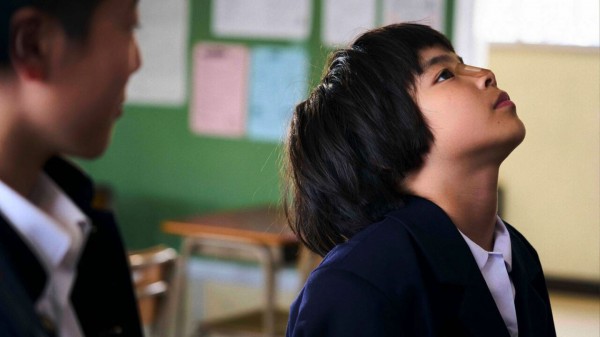
KANA OSAWA IN AMIKO
Unusual girl
Based on Natsuko Imamura’s multiple-prize-winning 2010 debut novel, Atarashii Musume ("New Daughter"), this is about a schoolgirl in an unspoiled, indulgent Japan that nonetheless has trouble dealing with her - or at least her father does. As the girl, Amiko, Kana Osawa steals nearly every scene (there's a little boy in her class who holds it pretty well a couple of times though). As her parents, Arata Iura and Machiko Ono do well, but lack equal voltage. Mark Schilling of The Japan Times is reminded by Osawa of Yuya Yagira, the child lead in Hirakasu Koreeda's memorable film about abandoned children, Nobody Knows. Both he says have "the same piercing look, sense of being ferally apart from the general run of humanity."
This is a portrait that takes into a sensibility that's impenetrable. But this is very Japanese, because the Japanese normally hold back, and communicate by hints, which sometimes remain unknown. Amiko's self-possession is, nonetheless, a wonder, but also a danger. Some have speculated if she is "on the spectrum," though director Morii prefers to think not, or to disregard the question. The fact is Amiko's not the only person with issues here.
Amiko's family seems to exist independent of her and she of it, though this proves not the case. Not surprisingly she and her older brother are ships that pass in the night. It seems also the mother is a new arrival, whose big mole on the chin causes remark from her and her brother. Amiko has nothing to do with the rushing off of the latter, to hospital, to have a baby. But when her father returns, and later her new mother, with no baby, she does notice, and is sad, first for her mother, and later for herself. She sees there as being a lost or missing little brother, and the way she calls attention to this is profoundly disturbing to her mother, who goes into a chain of wailing by Amiko's gesture, and remains in decline. Amiko's father is gentle and quiet. But that also means withdrawn and ineffectual, and this leads to his solving the clash between Amiko and his wife in a way that is needlessly cruel.
That is the situation at home. There is also life at school, which takes up much of Amiko's time and shows she's outside the norm, also unable to cope well with studies. She goes around barefoot, sings in class, and isn't keeping up with lessons. A classmate, the only one who addresses her, tells her she stinks and advises her to wash. He mocks her ignorance of the writing system displayed in classmate's calligraphy samples on the wall. Ironically, Amiko's mother teaches calligraphy, and she was going to be included as a friendly gesture, despite her backwardness.
This little boy is the best drawn and most appealing character in the film. It emerges that despite his teasing and sharpness, he is there: he is willing to talk to her. In his last speech to her, when she's about to be sent to her grandmother's and to another school, is not to forget him. He recognizes that Amiko is in love with another boy, Nori, who has no use for her. When she declares her love to Nori he attacks her and she leaves school for the last time with a bloody nose.
This is strange, vivid stuff - set off by classic traditional Japanese house interiors and the verdant coastal hillside identified by some writers as Hiroshima, though others suggest it's to be identified onl as "a provincial coastal town." But director Morii handles it with great clarity, even if overall the story is too ambiguous and unpleasant to be satisfying.
Amiko こちらあみ子, 104 min., was screened for this review as part of Japan Cuts, New York (July 26-Aug. 6, 2023, where it was shown Tuesday, August 1, 2023, 6:00 pm, and on Aug. 9 was awarded the the third Obayashi Prize from the festival's Next Generation section . The citation noted how adeptly the film recreates the little girl's "vivid auditory and visual world."
Last edited by Chris Knipp; 08-12-2023 at 07:52 PM.
-
SAGA SAGA 緑のざわめき (Aimi Natsuko 2023)
AIMI NATSUKO: SAGA SAGA 緑のざわめき (2023)
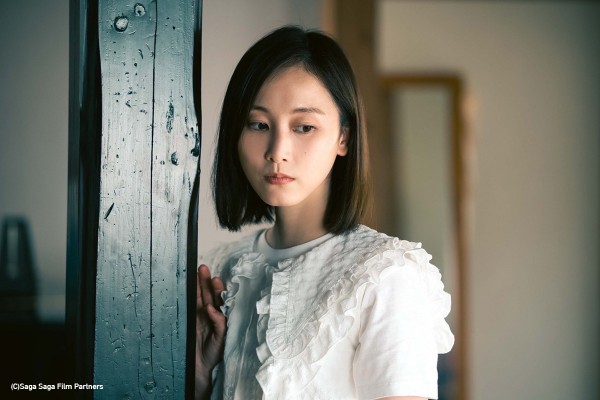
RENA MATSUI IN SAGA SAGA
Surprise connections
Natsuko's teasing, slightly misfired sophomore feature, presented in Academy ratio, gradually narrows down a world that at first seemed loose-limbed and far-flung: the main characters turn out all to be related by the male line and confined by unpleasant memories. Kyoko (Rena Matsui), who has been working as a film actor in Tokyo, flees from all that, takes a lowly clerk job, and moves out of the metropolis. Nahoko (Sae Okazaki), a strange, pretty girl, approaches her, like a stalker, and turns out to have been just that. She claims fandom, but the real cause is more personal. There is also a subplot involving a handsome young man and online dating.
Kyoko also meets Anna (Sara Kurashima, looks older), an 18-year-old high school student under the care of her deceased mother’s best friend, whom Kyoko unwittingly learns is her half-sister. The delicacy, the beautiful landscapes and classic Japanese interiors, and the shy ladies had my attention and my admiration in the introductory scenes. But the overlong second half lost me. Besides that, the subplot, including an outrageous detail, felt unnecessary.
They all come together at a resort, and all turn out to be related and to have traumatic experiences with men in their lives - very much the theme these days.
Natsuko's 2019 debut feature, Jeux de Plage, reportedly is a homage to numerous French directors. It too is set at a resort, but this time girls are all holidaying together and there is a secret lesbian attraction revealed. It's divided into playfully named chapters whose additional homages to French cinema are only too obvious: episodes named (Le?) Weekend, La règle du jeu, Vivre sa vie, La femme douce, Drôle de drame, La poison, Les biches, L’amour en fuite, À nos amours, La drolesse , and La ronde.
It sounds like she was having fun. In Saga Saga things turn serious. Look behind the mask of any worman, the film suggests, and you will find trauma, and the neglect or abuse of a man. Gestures toward playfulness remain, in the games and deceits of Nahoko - but she becomes ashamed of her ploys and plays, and hides under an umbrella.
Maybe Jeux de Plage works better. One hopes Saga Saga is a sophomore slump and Natsuko's next film will be a success. Saga Saga lost me. I started getting uncomfortable with the acting - a very bad sign; and missing a score (there's almost none), not a very good sign either.
The Japanese title of the new film, Midori no zawameki, translates as "the green mist." The French influence may still be there, on the surface anyway, if this is an allusion to Éric Rohmer's celebrated 1986 film starring Marie Rivière, Le rayon vert. But there's no green ray in this movie, only the hope of uniting traumatized young women.
Saga Saga 緑のざわめき, 114 mins., no IMDb listing, was screened for this review as part of Japan Cuts, Jul. 26-Aug. 6, 2023, and showed Aug. 2, 2023 6:00 pm.
Last edited by Chris Knipp; 08-14-2023 at 01:37 AM.
-
PEOPLE WHO TALK TO PLUSHIES ARE KIND ぬいぐるみとしゃべる人はやさしい (Yurina Kaneko 2023)
YURINA KANEKO: PEOPLE WHO TALK TO PLUSHIES ARE KIND ぬいぐるみとしゃべる人はやさしい (2023)
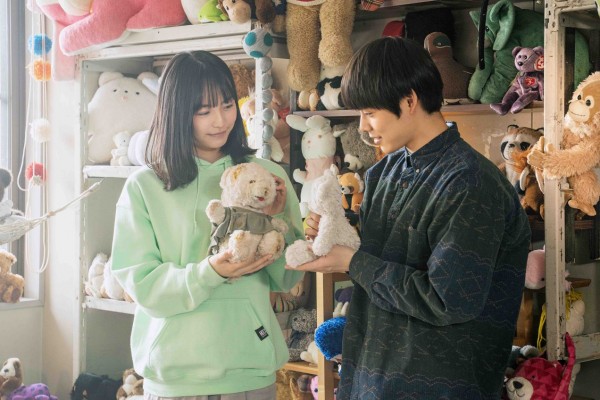
REN KOMAI, KANATA HOSODA IN PEOPLE WHO TALK TO PLUSHIES ARE KIND
A Japanese subculture reveals isolation and emotional fragility of young people
Co-scripted by Kaneko, her directorial debut, and adapted from a story collection by Ao Omae, the story focuses on three protagonists who are members of a Kyoto university plushies club: Tsuyoshi Nanamori (Kanata Hosoda), a sensitive guy who can’t feel romantic love; Mimiko Mugito (Ren Komai), a depressive girl who befriends him; and Yui Shiraki (Yuzumi Shintani), a cheerfully frank woman whose interest in the club begins as a mystery. Tsuyoshi and Mimiko, college freshmen, enter a club, expecting a craft workshop, and find instead people interacting with plushies, cuddling, confiding, sharing with them, wearing earplugs to avoid eavesdropping on the others. But they're similarly introverted, and find here in the "PLC, the plushie club, a sympathetic environment.
For the very shy, this is a good outlet. And for the shyest of cultures, the Japanese, it's an logical development. Yui Shiraki comes because she has been sexually harassed in another club. She and Tsuyoshi, who's been shown at first to be ready but unable to proceed with girls, start dating, though Yui says he doesn't seem like a lover. (In fact she dumps him, after a night in bed together in which nothing happens.)
Mark Schilling opens his Japan Times review of this film by saying that recent surveys have shown 40% of Japanese young people (20's and 30's) are unhappy; the need for this kind of comforting, in other words, is widespread in the culture. For a western viewer, the film, with its sweetness and delicacy and odd interactions, at first will look like science fiction. But with a sense of Japanese culture, the whole thing makes sense quite quickly, and winds up not being so remote after all. We just want to see how it will play out.
Tsuyoshi and Yui become a temporary couple, but Tsuyoshi also has to tend to Mimiko, who becomes so shy she can't leave her room. He brings her class notes so she can go on with university in some form, but she seems like a stranded-away-from-home hikikomori person, a severe case. (Eventually, she finds her way out.) A girl in the PLC is gay, and brings her girlfriend. She knows the club members won't judge her. A boy with whiskers remains undefined, but we see what he needs to talk to a plushie about is the meanness and hostility in the world. The others do craft plushies, but this guy says he just makes "pockets." He took the eyes off.
More trouble comes for Tsuyushi, who emerges (shyly) as the main character. At first trying to remain friends, he later clashes with Shiraki, who finds him too self-righteous, and this pains him. He goes home because the family dog, Gon, has died. He addresses the deceased Gon and introduces him to Ghostly, the plushie he has made, but cuts himself off when his mom appears. He goes out with some old pals, but when they mock him for being a virgin, he runs off offended: he is just too sensitive for this world.
And now Mimiko, who has come out of her room, finds Tsuyoshi, looking different, his hair bleached orange, he says, to look"more like a ghost." He is damaged. (Is he maybe non-binary?) They have a long, intimate conversation, explaining themselves. The dialogue takes a decided ##MeToo slant; it risks editorializing too obviously. But the two young actors are very touching. Yurina Kaneko has a fresh voice here.
The story remains open-ended. The plushie club and its members are an oasis in a cruel world, for sure; a new member shows its help is ongoing. But is there such a thing as being too kind, too sweet? Shiraki thinks so. She doesn't talk to plushies...
People Who Talk to Plushies Are Kind ぬいぐるみとしゃべる人はやさしい, 109 mins., opened Apr. 14, 2023 in Japan; festival showings Jun. and July in Shanghai and Montreal. Screened for this review as part of Japan Cuts, New York (Jul. 26-Aug. 6, 2023)where it was shown Saturday, August 5, 2023, 6:30 pm (US premiere).
Last edited by Chris Knipp; 08-17-2023 at 11:37 AM.
 Posting Permissions
Posting Permissions
- You may not post new threads
- You may not post replies
- You may not post attachments
- You may not edit your posts
-
Forum Rules





 Reply With Quote
Reply With Quote
















Bookmarks